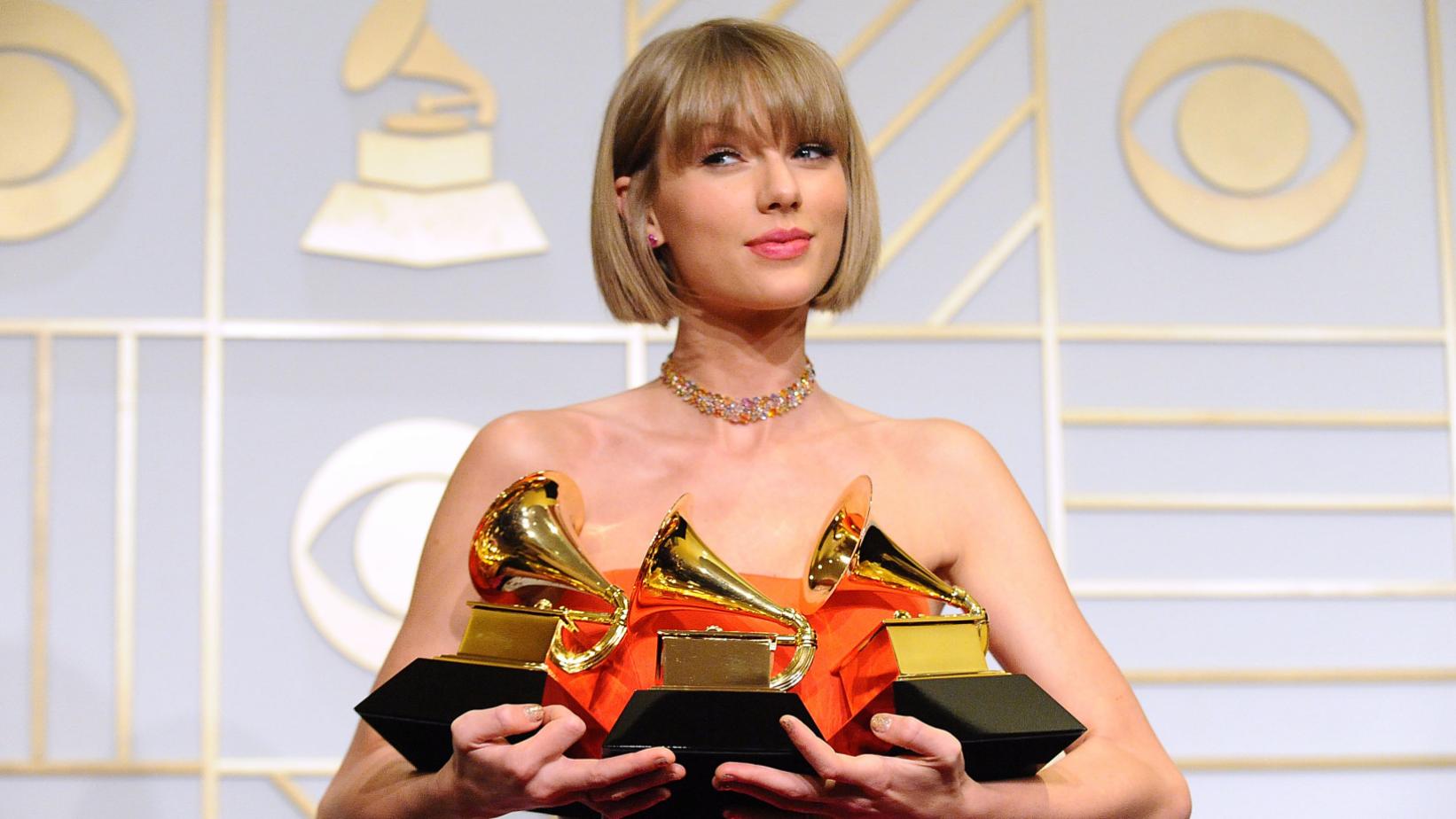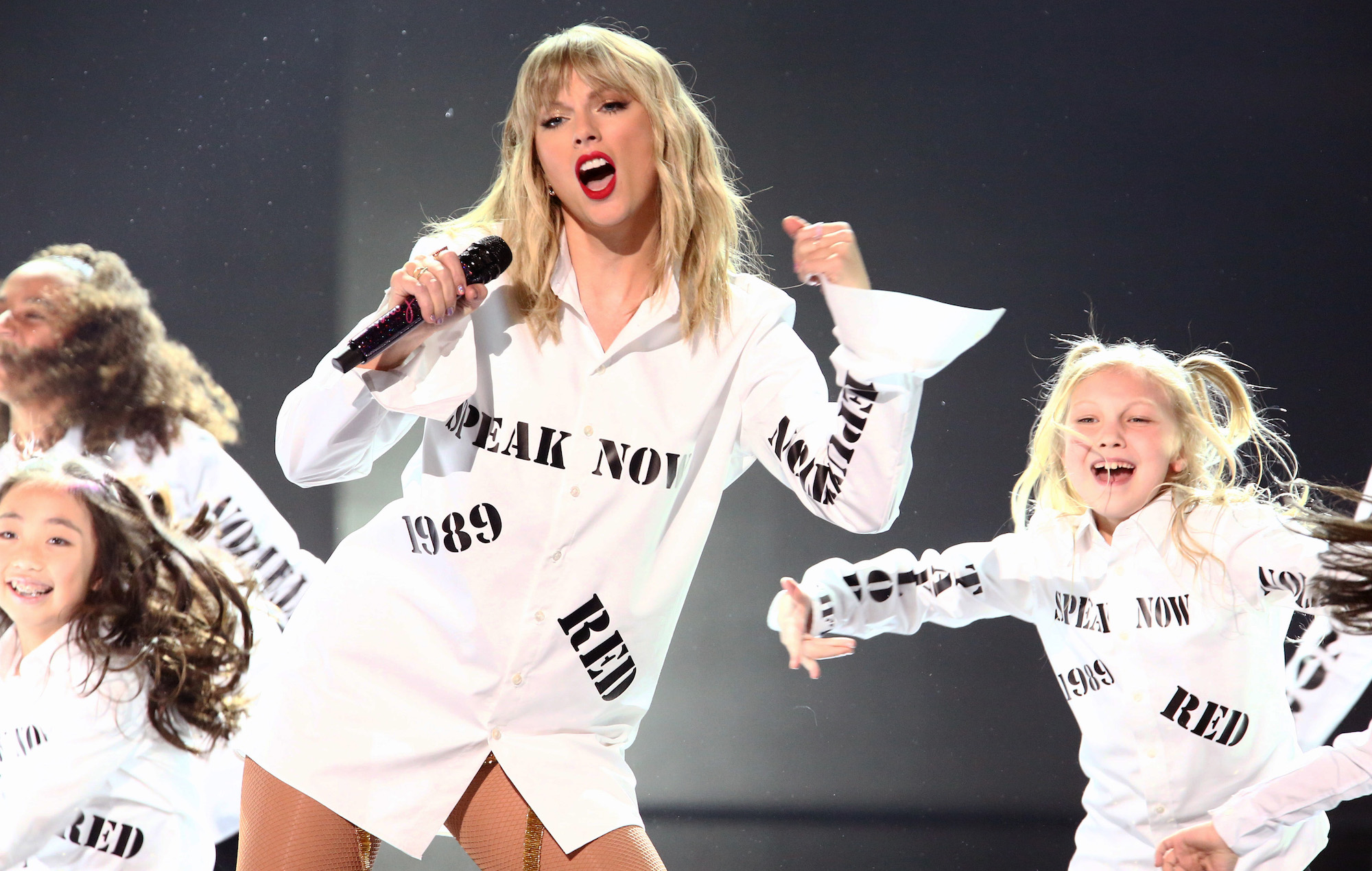Netflix’s new documentary Miss Americana focuses on Taylor Swift as she navigates politics, expectations of herself, a sexual assault trial, and a profound sense of loneliness.

It’s been a big fifteen years for Taylor Swift. Launched into fame at sixteen years old with her singles “Our Song” and “Tim McGraw,” she has since won ten Grammys, broken multiple records, been dubbed “America’s Sweetheart,” and has the most decorated country and pop albums of all time.
It was 2009, and the biggest songs of the year were Love Story and You Belong With Me. Taylor Swift was either someone you adored, or were indifferent to, but she wasn’t hated yet. It was also the year for the infamous moment in Pop-Culture history “I’mma let you finish…” At 19 years old, Swift won Best Female Video for her teen anthem You Belong With Me at the MTV Video Music Awards, and, notoriously, was interrupted by Kanye West. Booing ensued as Kanye left the stage cockily, and a teary Swift walked away, believing that the booing was for her, and not him. It was this moment that ignited one of pop’s greatest feuds.
In the years that followed, lyrics to smash hits like I Knew You Were Trouble, Shake It Off and Blank Space could be recalled within an instant. Swift was still loved, up until the 2016 Grammys, where she took home Album of The Year for 1989. In the wake of West’s song Famous detailing “I feel like me and Taylor might still have sex/Why? Because I made that bitch famous/I made that bitch famous,” her speech seemed to hit back at the lyrics. She explained that “there are going to be people who try to undercut your success or take credit for your accomplishments or fame, but if you just focus on the work and don’t let those people sidetrack you, someday when you get where you’re going, you’ll look around and you will know that it was you and the people who love you who put you there.”
A social media circus ensued when Kanye West secretly recorded a private phone call to Swift letting her know she would be “name-checked” in his new song, but not telling her it would follow with “I made that bitch famous.” As Taylor Swift puts it that “Summer [was] the apocalypse.” Tweets and headlines calling Taylor a snake plastered the internet from every tiny corner and crevice to front-pages of the New York Times. A mural was painted to signify the end of her career:

After disappearing from the public for over a year, she returned for a sexual assault trial in 2017 against former DJ David Mueller who groped her at a meet and greet in 2013. In the documentary, Swift said that “there were seven people who saw him do this, and we have a photo of it happening” and she was still being torn apart in court. She sued him for $1 and won.
A month later, her angry, robust single Look What You Made Me Do made waves for being “bitter” and “plain awful.” Her bombastic album Reputation dropped, and despite the lead single’s reception, it was critically acclaimed and nominated for Pop Album of the Year. It was shut out of all other categories at the Grammys though, and when Swift gets the news, she flinches, ever so slightly, and her only response is “I need to make a better record.”
This is where her documentary Miss Americana comes in. Directed by Lana Wilson, who has won Emmy awards for her documentary on abortion, it follows Swift throughout 2018 and 2019 and attempts to breakdown the complexities and nuances of her identity. Its multifaceted nature, everything from politics to sexual assault, to her eating disorder is characterised by one thing: a woman who is still trying to find her place in the world.
The name Taylor Swift conjures many responses, words and reactions, varying from “bitch” to “icon” to “snake,” almost like a fully-formed montage that instantly floods your memories. Swift, like many major celebrities, has been battling the public dehumanisation and depersonalisation of herself. With almost fifteen years in the spotlight, it’s no surprise that the only thing left for the public to do was to become disillusioned with her, as they did in 2016.
So, why does Swift willingly deconstruct her life and persona to further her own disillusionment in the documentary? Perhaps, this is because it is the only way for her to slowly humanise public perception of her. Identity is a complex thing for any individual, but navigating it alongside millions of people who know exactly who and what you should be is near impossible.
In one of the most palpable moments in the documentary, Swift’s voiceover interrupts her Grammys speech to detail “I was at the top of the mountain, but I had no one to share the view with. I thought ‘Shouldn’t I have someone I could call right now?'”
That last line echoingly haunts the documentary “Shouldn’t I have someone I could call right now?”
You may shake your head. She has an abundance of model friends, squillions of fans, awards and records to her name. Everyone wants to be her friend, everyone wants to be her, over 76 thousand people screamed her name at her Apple Music recorded concert in Sydney. However, at the core, those relationships lack the authenticity of human connection.

Relationships are tricky things for anyone to navigate, but relationships with people who already have a pre-conceived perception of you and are unwilling to change that, are near impossible. For Swift, people only want the shiny bits of her life, the bits that glisten like glass in the sun, colours glittering and reflecting in the light.
Here’s the thing, people are not like that, we are all just mosaic broken hearts trying to form genuine connections with people. With a perfectly manicured public persona, there was no room for Swift to develop such things. In her confessional single Delicate, she details the one relationship that seems authentic to her “my reputation’s never been worse so, he must like me for me.” At the heart of the documentary, Swift presents as a woman who is struggling to form her identity and her relationships in fame’s hollow wasteland.
Adolescence is the difficult period where teenagers attempt to navigate who they are amongst the pressures of their friends and family. Swift’s adolescence was characterised by the opinions of strangers, fans, and journalists, so her confession that she was “living for the approval of strangers” seems detached from our experience of identity.
Identity is like play doh, it can be sculpted, pinched here, tucked in there, and is malleable enough to suit anyone’s opinion, if you let it. It’s like being three years old again, and there’s this perfectly pink sculpture sitting in front of you, and you’re proud. But then, your friend comes by and says that it shouldn’t be pink, maybe try a real colour like blue instead. You stare at the pink sculpture, but you crave your friend’s approval, so you toss the pink one out and build a slightly different one that resembles the first. When you’re finished, your friend says “that’s good! You’re done! Now you’re perfect!” That praise is so important, it’s validating, it’s nurturing, it’s ecstasy settling into your heart and being pumped through your body with every beat. Swift tells us that “those pats on the head were all I lived for” and “I became the person who everyone wanted me to be.”
Imagine having millions of “friends,” each with a different idea for your sculpture. Instead of your parents, or the boy with soft brown eyes and generic, monosyllabic first name unknowingly altering your identity, it’s squillions of people who care about what they can get from you. Your sculpture would change repeatedly, colour, shape, size, you name it, it would change. This is the only way I can summarise what Swift has confessed to us in her documentary.
Of course, the inevitable has occurred for Swift and she notes that “when you are living for the approval of strangers, one bad thing can cause everything to crumble” so “when people decided I was wicked and evil and conniving and not a good person, that was the one I couldn’t bounce back from because my whole life was centred around it.” Her play doh sculpture had been taken from her, millions of people had taken bits and pieces of it, and left it with a big, gaping hole. What’s worse, is that for Swift, the sculpture was inherently formed by public approval, and when she realises that their interest in her lacked all authenticity, her sense of identity crumbled and dissipated. Being a wallflower became the only option and looking straight into the camera she reminds us “nobody physically saw me for a year.”

Identity and relationships seeped into the other facets of her life, and she touches on her battle with an eating disorder in her 20s, her mother’s cancer, and her political debut.
Riding in the back of a car, the camera focuses on Swift’s face. She looks down at herself, almost like she’s summoning the courage to publicly confess this and looks back up at the camera and says “it’s only happened a few times, and I’m not in any way proud of it” but there would be “a picture of me where I feel like I looked like my tummy was too big, or…someone said that I looked pregnant…and that’ll just trigger me to just starve a little bit.”
She explained that “there’s always some standard of beauty that you’re not meeting. Because, if you’re thin enough, then you don’t have that ass that everybody wants, but if you have enough weight on you to have an ass, then your stomach isn’t flat enough. It’s all just fucking impossible.”
Taylor pulls up a picture of herself and admits “this would cause me to go into a real shame, like hate spiral…I caught myself yesterday start to do it, and I was like: nope. We don’t do that anymore…that didn’t end us up in a good place.”
Footage of her 1989 World Tour Concert filled the screen as Swift notes “I thought that I was just like supposed to feel like I was going to pass out at the end of a show, or in the middle of it…I thought that was how it was. Now I realise, no, if you eat food, have energy, get stronger, you can do all these shows and not feel it. Which is a really good revelation. Because I’m a lot happier with who I am.”

The other aspect of Swift’s life we are privy to is her journey to political awareness. In 2018, she broke her silence with an Instagram post which endorsed two Democratic candidates and revealed “I cannot vote for someone who will not be willing to fight for the dignity of ALL Americans, no matter the skin color, gender, or who they love.” She went on to explain that “so many intelligent, thoughtful, self-possessed people have turned 18 in the past two years and now have the right and privilege to make their vote count.”
In 2018, what we didn’t know was the behind the scenes battle that occurred for this post to make its debut. In the documentary, Swift can be seen with a handful of white men, her mum and her dad discussing this decision. These men, including her father, are firmly against it, their belief is that she is willingly denting her ticket sales by 50%. They tell her to fear violent backlash, her safety, her career and destructive headlines like “Taylor Swift Comes Out Against Trump.”
Passionately, Swift declares “I don’t care if they write that…I’m sad I didn’t (come out about politics) two years ago, but I can’t change that. Right now, this is something I know is right. I need to be on the right side of history.” She continues with “if I get bad press for saying ‘Don’t put a homophobic racist in office,’ then I get bad press for that.”
It is now 2020, and it seems that Swift’s career hasn’t taken a dent as a result of her political stances, she has increasingly spoken up about politics, even in her music. From You Need To Calm Down a pop-confection that anthemically proclaims “shade never made anybody less gay” to the masterpiece which gave this documentary its title Miss Americana and the Heartbreak Prince. Set in a metaphorical high school with classic tropes like cheerleader chants “Go! Fight! Win!” the song details the disillusionment with romance, but most importantly politics. Lyrics like “American glory/faded before me,” “the whole school is rolling fake dice/you play stupid games, you win stupid prizes” and “boys will be boys, then/Where are the wise men?” capitalise on the adolescent American dream.
As the film comes to a close, we watch Swift make her latest political statement in her new song Only The Young. The song possesses the unique storytelling that Swift has and the pop confectionary of her current genre. It is clearly aimed at teenagers, the generation that seems to care more about the state of the world than those in government. She explains that “only the young can run” and that “the big bad man and his big bad clan…aren’t going to help us (they are) too busy helping themselves” urging today’s youth that “it’s just a matter of time/Up there’s the finish line/So run.” It also touches on school shootings, how “the wrong ones think they’re right” but that the youth are the future and “only the young can run.”

Overall, Miss Americana is a genuine, authentic portrait of a woman who is still coming into her own. Its navigation of the intricacies of identity has given us an insight into a human being who is walking the fine line between fame, public perception, and humanity. Our disenchantment with Taylor Swift’s perfectly manicured public persona has only humanised her in the best way possible.
Subscribe to FIB’s newsletter for your weekly dose of music, fashion and pop culture news!







